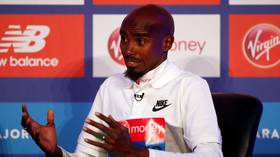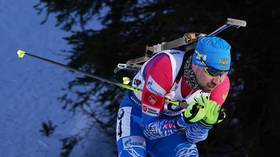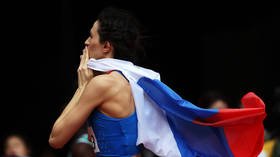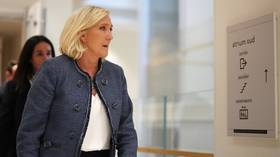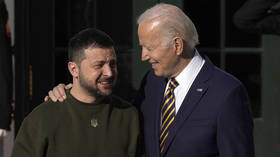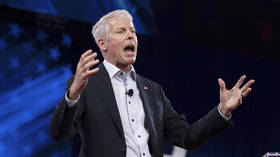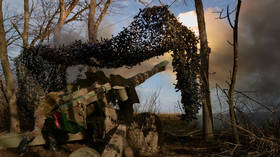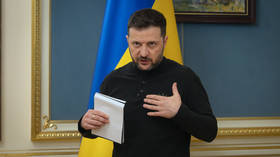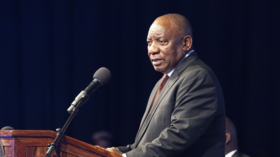Blood tests by video and suspect social media chats: Are drug cheats & match-fixers winning as sport remains stuck in shutdown?
As some players and fixers desperately try to restore their incomes and athletes risk the temptation of performance enhancers and other drugs while sport stands still, anti-doping and governing bodies are feeling the pressure.
With little sport to bet on and few serious contests taking place, the issue of organized cheating has perhaps never been further from public consciousness than now.
While betting companies have been forced to focus on obscure competitions and eSports, the only athletic records that are there for the taking in the foreseeable future are those for the longest periods spent indoors by some of the fittest people on the planet.
In the labs and legal departments, though, old and new concerns are apparent, and the World Anti-Doping Agency's (WADA) annual Play True campaign could scarcely have felt more muted on April 10.
Also on rt.com Coronavirus and doping: WADA chief warns athletes not to use Covid-19 pandemic as opportunity to cheatWhat should have been an important show of global commitment to clean sport ahead of the Olympics was swallowed up by a more pressing message to stay safe in a year when those games will no longer be held, and an admission by WADA President Witold Banka that the anti-doping system would not be at "full power" while contact and travel restrictions are in place.
Despite the governing body advising Anti-Doping Organizations (ADO) to remind athletes that they can still be tested anytime, anywhere, it is hard to imagine officials turning up on doorsteps at short notice to enforce tests in the current climate, nor pulling professionals up on their whereabouts when many are pointedly ruing the frustrations of preparing for an uncertain schedule in indefinite confinement.
Some labs have temporarily closed, making the work of ADOs more difficult and their rules over the coming months inevitably looser.
Before the pandemic, Banka had been planning to create a solidarity fund for anti-doping efforts in regions such as Africa, where the only fully accredited laboratory is in South Africa. That is now also on hold while the agency concentrates on reinforcing safety campaigns and trying to ensure that it can resume rigorous testing as soon as possible.
“For clean athletes, the issue remains at the top of the agenda,” Dagmar Freitag, of the German parliament’s sport committee, told broadcaster DW, adding hopefully: "The training regimes will now have to be completely readjusted.
"This will open up completely new opportunities for an effective battle against doping. The experts in the national anti-doping agencies know exactly at what stage of the training cycles they need to test most often."
Professor Fritz Sorgel, the head of the Institute for Biomedical and Pharmaceutical Research in Nuremberg, called the postponement of the Olympics “an enormous burden” and fears that athletes could turn to cannabis or overuse chewing tobacco and antidepressants in the absence of sport.
"For every organization, it's primarily about survival,” he said. “The battle against doping will have to take a back seat now."
The United States Anti-Doping Agency (USADA) might not agree with Sorgel’s assessment. In a pilot program that most companies currently toiling to work remotely would consider technologically ambitious, their testers are taking their work online, recreating the surprise element of an in-person visit by sending athletes testing kits by post, followed by a video call in a one-hour window on any day testers choose.
Also on rt.com 'I firmly believe in my innocence': Olympic swimming champion Sun Yang handed EIGHT YEAR ban for breach of anti-doping rulesAthletes then show them around their bathroom to prove that they are alone, provide a urine sample in a container off camera, use a temperature strip to prove that the sample is fresh and close the sample with a tamper-proof lid.
Finally, each athlete uses a device on their arm to collect a blood sample in front of the camera, which is sealed on camera as part of a process in which documentation and oaths are also filmed.
While the idea is not as flawed as some cynics have suggested – athletes who try to use old urine stored at room temperature, for example, would be exposed by its foul smell and lack of common characteristics with their blood sample – there is an evident risk that determined cheats will find a way around the limitations of the technology.
“One cool thing about virtual doping testing is that if you aren’t ready to give a sample you can stay on camera and do other things, so I am crocheting,” Aliphine Tuliamuk, the current US Olympic trials marathon champion and one of the first volunteers, joked during her virtual test on Sunday. “They called me right after a bathroom break.”
Germany's equivalent of the agency, meanwhile, rebuffed the idea that some athletes might be using the downtime to try new substances or test ways of evading detection. In a statement, officials told DW that overall health was their “sole focus” and dismissed “any idea of placing all athletes under general suspicion.”
One group who undoubtedly are under suspicion, according to Alex Marshall, the head of the International Cricket Council’s anti-corruption unit, are people keen on fixing the outcomes and in-game developments of sports matches.
“We are seeing known corrupters use this time, when players are on social media more than ever, to connect with them and try to build a relationship that they can exploit at a later date,” the former police chief, whose team were said to be investigating 50 cases at the start of this year, told the Guardian.
Cricketers can be punished for failing to report a hint of a suspicious approach. “Corruptors will be losing income and they might see it as an opportunity to reach out to players,” said Hayley Green, the anti-corruption manager at the England and Wales Cricket Board.
“The longer the lockdown continues and certain tournaments don’t take place, absolutely it will be going through their minds when and how to reach out to players.
Also on rt.com Top tennis ace among 135 players suspected in massive match-fixing scam – reports"That’s not just cricket – you might expect a trend across sport.”
Where cricketers and the criminals keen to collaborate with them are suffering from reduced cashflow without sport, the shortfall caused by the crisis has been particularly clear in tennis.
Serena Williams's coach, Patrick Mouratoglou, was outspoken about the financial peril the suspension of the sport placed on lower ranked players whose earnings rest precariously on tournaments, but the five-week tournament he is aiming to hold at his French tennis academy has been the subject of a message from the Association of Tennis Professionals reminding players to guard against corruption.
Also on rt.com Serena Williams' coach: It's 'revolting' lower-ranked tennis players can't make a livingSix matches on the ATP tour have already come under scrutiny from the regulated betting industry this year, with 32 from the International Tennis Federation also referred to the Tennis Integrity Unit in London.
The total figure to mid-March is almost double the number recorded in the same period last year, with corruptors thought to have been eager to influence as many players as possible before the tennis calendar ground to a halt.
The unit’s concerns have led its Chair, Jennie Price, to launch a Return to Tennis campaign to “inform and protect” players. “It’s imperative that when tennis is able to resume, everyone involved is aware of the potential integrity risks,” she added.
